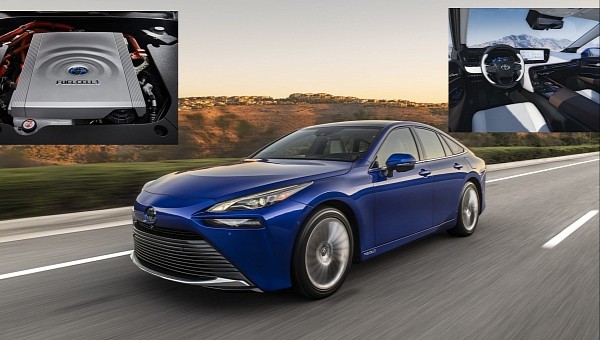The Japanese automaker has just announced the availability of the 2023 model year for the Mirai FCEV sedan, and the good news is that it has managed to retain the starting MSRP of $49,500. Alas, there is also a catch.
Some say that battery-powered electric cars might have already killed the hydrogen horse on which Toyota (at least in part) bet its future not long ago. Others might think that the company’s freshly anointed chief executive officer would be right to keep prioritizing hydrogen-powered cars. In the meantime, there are not a lot of fuel-cell electric vehicles to choose from.
In the United States, for example, you could select the Hyundai Nexo Fuel Cell if you want a crossover SUV. But maybe that’s not the best-case scenario, particularly because the 2023 model year has a starting price above the psychological $60k threshold. Another option would be to go for a traditional four-door sedan, instead. And, luckily, Toyota has you covered in that department.
After all, they just announced the arrival of the 2023 Mirai FCEV, which – astonishingly – has the same starting MSRP as the 2022 MY. That would be $49,500, thank you very much. But there are a few catches. First and foremost, the iconic Japanese automaker promises that customers will also get “up to $15,000 of hydrogen fuel included with (every) Mirai purchase of lease.” That sounds marvelous but do remember that FCEV refill stations are not as easily found as gasoline/diesel venues, even though both share the same convenience of getting the job done in a matter of minutes.
That is the biggest draw towards fuel cell vehicles, frankly – you do not need to spend a lot of time idling by while the battery-powered vehicle recharges. Also, the vehicles do not get a heavy battery pack because the Mirai and other FCEVs generate electricity onboard from the stored hydrogen, which is a compressed gas, as opposed to liquid fuels like gasoline and diesel. According to Toyota, the 2023 Mirai has an estimated EPA range of no less than 402 miles (647 km) for the XLE trim.
Now, back to the few novelties for the new model year. The main change is the addition of a new Toyota Audio Multimedia system on the XLE and Limited grades, with the design and engineering done in America by the Texas-based Toyota Connected Technologies team. There’s OTA (over-the-air updates), an available Connected Service Drive Connect, Cloud Navigation, and the ubiquitous Intelligent Assistant, among other things like dual Bluetooth connectivity, 4G hotspot, and standard wireless Apple CarPlay and Android Auto.
Additionally, the Toyota Teammate safety suite has features like Advanced Park and an optional Advanced Drive available on Limited Models. The MSRPs start at $49,500, but then, of course, one must also add the Toyota DPH (Dealer Processing and Handling) fee of $1,025, and the Mirai Limited starts a lot higher, at $66k.
Last, but not least, one can also add the Advanced Technology Package for $1,410 on the XLE grade, as well as optional 20-inch wheels ($1,120) or the Toyota Teammate ($5,170) on the Limited trim. Plus, even the fancier Special Color list is not free of charge. So, the Oxygen White, Heavy Metal, Supersonic Red, and the Limited-exclusive Hydro Blue all cost $425, each. That way, maybe one will never forget that early adopters always end up paying more than they bargained for!
In the United States, for example, you could select the Hyundai Nexo Fuel Cell if you want a crossover SUV. But maybe that’s not the best-case scenario, particularly because the 2023 model year has a starting price above the psychological $60k threshold. Another option would be to go for a traditional four-door sedan, instead. And, luckily, Toyota has you covered in that department.
After all, they just announced the arrival of the 2023 Mirai FCEV, which – astonishingly – has the same starting MSRP as the 2022 MY. That would be $49,500, thank you very much. But there are a few catches. First and foremost, the iconic Japanese automaker promises that customers will also get “up to $15,000 of hydrogen fuel included with (every) Mirai purchase of lease.” That sounds marvelous but do remember that FCEV refill stations are not as easily found as gasoline/diesel venues, even though both share the same convenience of getting the job done in a matter of minutes.
That is the biggest draw towards fuel cell vehicles, frankly – you do not need to spend a lot of time idling by while the battery-powered vehicle recharges. Also, the vehicles do not get a heavy battery pack because the Mirai and other FCEVs generate electricity onboard from the stored hydrogen, which is a compressed gas, as opposed to liquid fuels like gasoline and diesel. According to Toyota, the 2023 Mirai has an estimated EPA range of no less than 402 miles (647 km) for the XLE trim.
Now, back to the few novelties for the new model year. The main change is the addition of a new Toyota Audio Multimedia system on the XLE and Limited grades, with the design and engineering done in America by the Texas-based Toyota Connected Technologies team. There’s OTA (over-the-air updates), an available Connected Service Drive Connect, Cloud Navigation, and the ubiquitous Intelligent Assistant, among other things like dual Bluetooth connectivity, 4G hotspot, and standard wireless Apple CarPlay and Android Auto.
Additionally, the Toyota Teammate safety suite has features like Advanced Park and an optional Advanced Drive available on Limited Models. The MSRPs start at $49,500, but then, of course, one must also add the Toyota DPH (Dealer Processing and Handling) fee of $1,025, and the Mirai Limited starts a lot higher, at $66k.
Last, but not least, one can also add the Advanced Technology Package for $1,410 on the XLE grade, as well as optional 20-inch wheels ($1,120) or the Toyota Teammate ($5,170) on the Limited trim. Plus, even the fancier Special Color list is not free of charge. So, the Oxygen White, Heavy Metal, Supersonic Red, and the Limited-exclusive Hydro Blue all cost $425, each. That way, maybe one will never forget that early adopters always end up paying more than they bargained for!





















